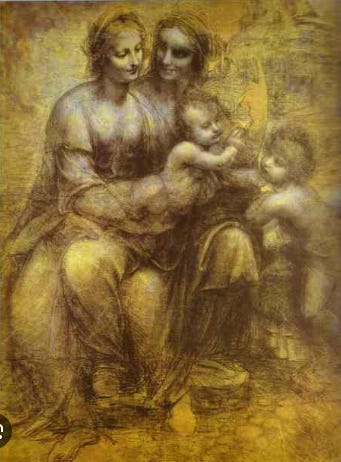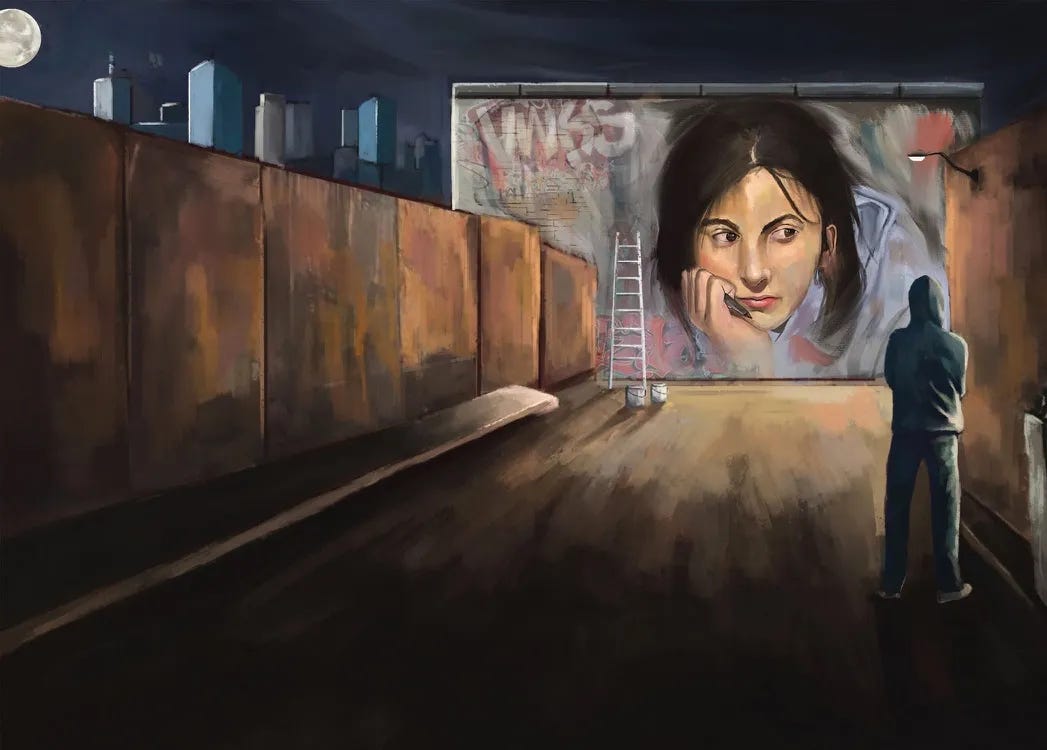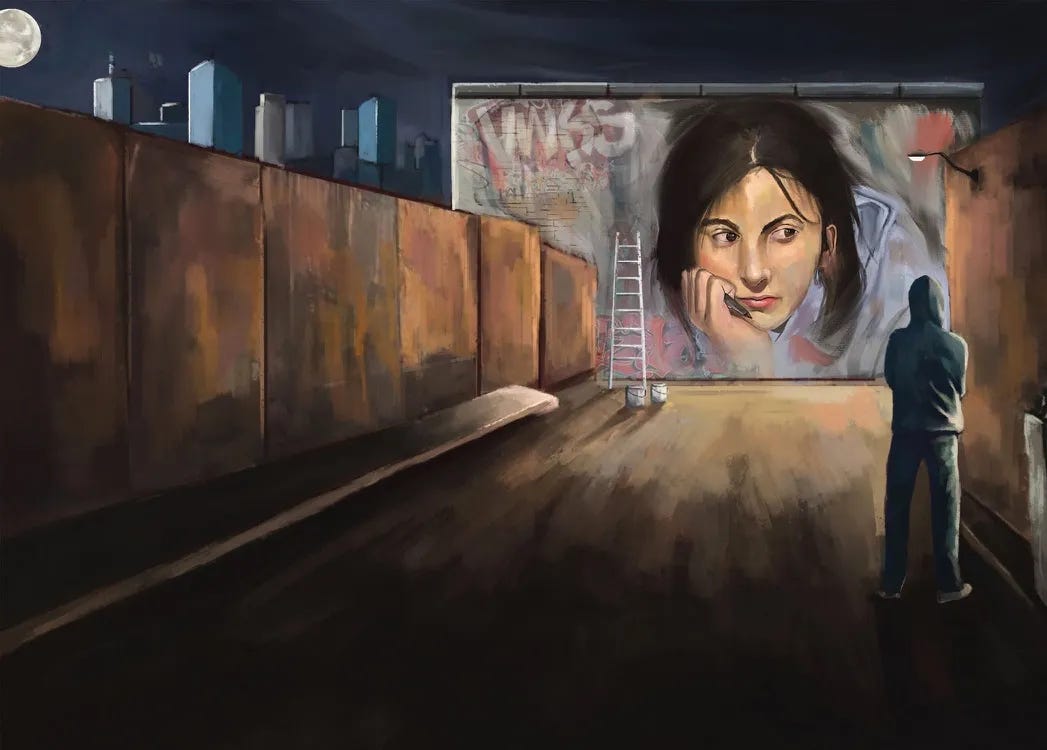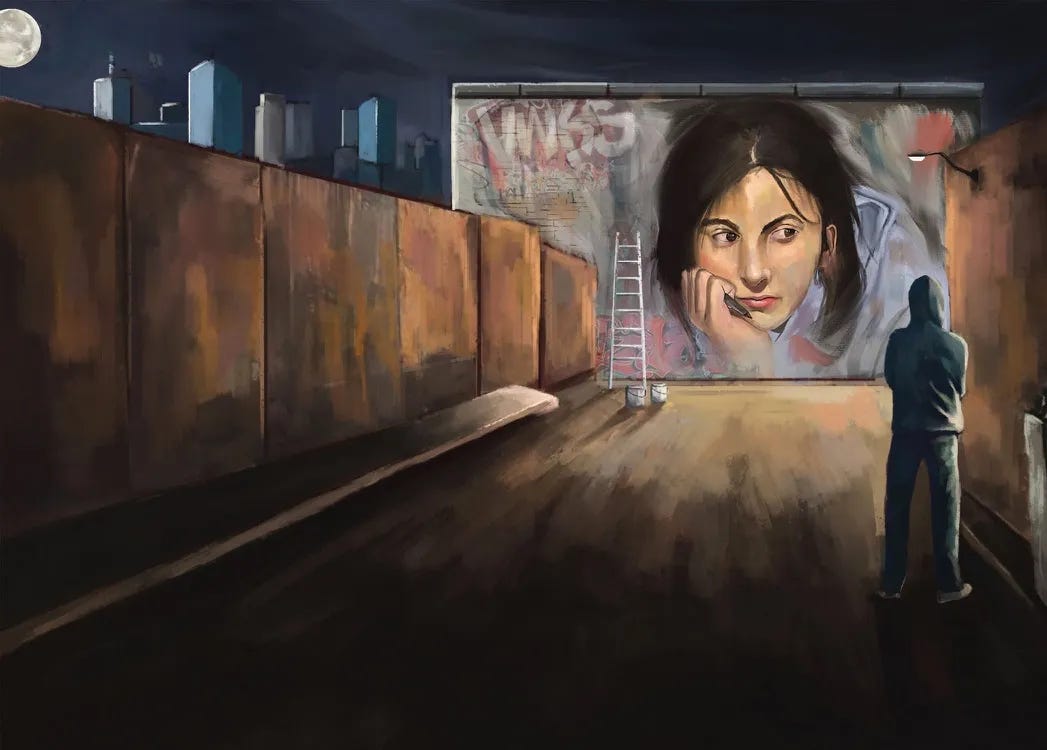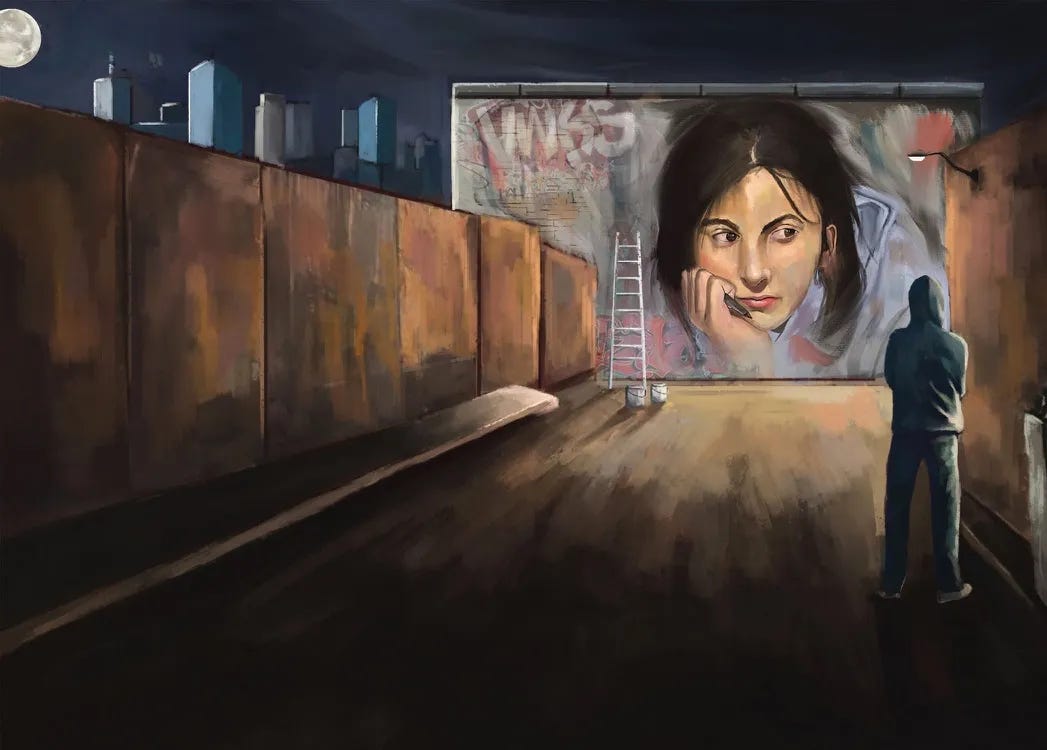Ms McInness said I could sit in her classroom this lunchtime. So I’m sitting and writing. I need to write. I need to do something to stop the panic.
Ms McInness has got lots of artwork around the room. Prints of famous pictures. There’s one I’ve been staring at for the past little while. It calms me down. It’s a drawing by Leonardo da Vinci called Cartoon on St Anne with Madonna and Child and St John. I think it’s the most beautiful picture I’ve ever seen. Some of the detail is incomplete, but the faces – of the two women and of the two babies – are so perfect it makes me want to cry. The women have the faintest of smiles, as if they’re utterly at peace with each other, with their babies, with the way things are. Looking at this drawing makes me feel different, as if there are times in a life when everything is as it should be, where goodness and beauty are the principles that organise the world. I’ve been staring at the picture ever since the class left and Ms McInness shut the door.
When I stare at the picture, I forget myself. The consolation of art, I once heard Grandpa say.
Grandpa and I discovered Zeph missing yesterday morning. He wasn’t in his room, and he didn’t turn up at school. I’ve tried ringing his phone but he doesn’t answer. He didn’t come home last night and he’s not at school today. I’m scared. I feel sick with worry. I feel angry. I feel overwhelmed. I want to go home and find Zeph there. I want Grandpa to be his old self again. I want all this crap directed at Ms McInnes to go away.
Everything is unravelling.
A month ago it was different. Ms McInness was excited about my story, as I hoped she would be. I kind of wrote it for her. And for Zeph I guess. Anyway, they both loved it. And it caused a bit of a stir in the English class. Grandpa was pleased too. I once heard a writer say that the only reason she ever wrote was in order to be loved, and I kind of get that. Loved? Seen? Both, I think. All I know is that writing that story and getting that kind of feedback made me feel more connected to a lot of things. To the adults in my life, the class, to Zeph. And to all kinds of feelings and impulses that before had felt maybe they were what separated me from others and from life. I don’t know. This is not easy to articulate.
But then, over the past weeks, it’s all started to unravel. My story has got Ms McInnes into trouble. It’s totally unfair and insane but it’s making her preoccupied and withdrawn (though we did have a wonderful lesson last week, like English with Ms McInness used to be). And perhaps it’s somehow connected to Zeph suddenly disappearing.
What’s happened? Where is he? I dropped by the old warehouse on the way to school this morning, but he wasn’t there.
He’s lived on the streets before. I think he might be living there again. It rained all last night. It rained really hard. I hope he’s alright.
At the local library there is a poster of missing people. There are lots of them. Some of them will never be found. And some of them are our age. Zeph is now a missing person.
I want Zeph to come back.
I had a horrible argument with Grandpa last night. I was upset and was saying that I didn’t understand why Zeph would have wanted to leave. He said that Zeph was different from us, that his upbringing had been a difficult one, that he was inevitably affected by it and that it wasn’t surprising that he found attachment problematic. It was just the way things were. I could feel Grandpa’s antipathy towards Zeph and I started crying and shouting. I locked my door and didn’t say much to Grandpa this morning. I feel drained and a bit lost. A lot lost.
Now I’ve just realised why I was so angry. Grandpa has always encouraged me to see through the apparent rationality of prejudice to its irrational core. That’s his phrase, not mine. When we watch the news on TV, he’s often commenting on how this politician is dressing up an appeal to prejudice in the clothes of common sense. We don’t want more immigrants because they might be a threat to our stability, they might take our jobs, they might undermine our values. Prejudice dressed as clear-headed reasonableness. But that’s what he does with Zeph. All this stuff about his table manners or his unstable background. It’s just that Grandpa doesn’t like him.
In Leonardo da Vinci’s picture – I’ve just looked at it again – everything is in harmony, in balance. Everything, even what’s incomplete, is perfect. Like some poems, or some pieces of music, or like the bush or a garden or a flower or a leaf.
Is it just a matter of perspective? If I could position myself correctly, would I see that everything is just as it should be?
I’d like to be able to think that.
But I don’t.
There is an awkward silence when Molly walks into the English staffroom. She suspects she’s interrupted some poisonous commentary about her. She senses Rodney’s mocking eyes following her from the door to her desk.
‘Ah, the absent friend is joining us for lunch?’ he says. Others in the staffroom are looking embarrassed; the awkwardness seems to excite Rodney. ‘You’ve been avoiding us, my dear. We miss you.’
A mist fogs her vision. Her throat tightens with familiar upwellings of revulsion at his tiny-minded sarcasm and his cruel relish. The meeting with Gillian Aldridge at the Institute looms. The euphoria from the Year 10 class earlier in the week has evaporated. She slept badly last night and has a headache.
Her desk is a mess, more of a mess than usual. But straight away she notices, in a space someone has made by pushing a text set aside, a thick brown envelope with her name on it.
‘Postman’s been,’ croons Rodney. ‘Special lunchtime delivery. How exciting.’
Molly can see that it’s from the Melbourne Teaching Institute. Some documents, no doubt, that Gillian promised to send her before the meeting. Molly dumps her bag noisily on her chair, picks up the envelope – she’s damned if she’ll open it in front of the salivating Rodney – and makes her way to an empty classroom.
There are the predictable brochures about the Institute and about procedures, and there are particular documents pertaining to her case. The first one she reads is a short note to the Institute from Elliot.
Complaints about Ms McInness’s teaching are not new, and numerous attempts have been made in the past to bring serious issues to Ms McInness’s attention, to give her counselling and support, and to set out ways in which the deficits in her approach might be rectified. In particular, she has been consistently advised to be guided more rigorously by the published marking criteria for student work. She has ignored this advice and guidance. Her encouragement of a student in the writing of a distorted and unflattering portrait of a colleague is further evidence of her lack of professionalism.
Rage again fills her being. The words are like spears thrust at her from an unfeeling and impregnable phalanx. Why do these utterly groundless accusations seem so potent? How to combat this measured and apparently reasonable tone when what she really wants to do is to tell them all they can get fucked? She’s being portrayed as a loose canon out to destroy a necessary and reasonable order. How she’d love to storm into Elliot Sullivan’s neat little anal-retentive office and confound his tiny mind, demolish his thin neat empty arguments, humiliate his petty preoccupations … with … as soon as she thinks it, she knows her words would be powerless, that in some hideous and inescapable way the Elliots of the world inhabit a world that is languaged and conceptualised in a way that makes them seem the keepers of good order, the guardians of professionalism. The more she rants and raves, no matter how articulately, the more his cool rationalism is seen as objective, sensible, responsible.
Molly flicks through and find other documents equally as galling.
Incident log. October 24th.
Mr Jensen made an appointment to see me today. It had been brought to his attention that a colleague, Ms Molly McInness, had supervised and encouraged the writing of a scurrilous portrait, disguised as a fictional character but clearly designed to lampoon himself. The passage was contained in a story purportedly written by Harriet Henderson but clearly written by an adult, at least in part, most probably by her teacher Ms McInness. The passage described Mr Jensen as having ‘cold blue eyes, a cruel mouth that seemed set in a kind of supercilious sneer. His lips were fat, fleshy and his teeth were slightly crooked.’ The character’s conversation was deliberately shaped (again undoubtedly influenced by Ms McInness, who has taken a peculiar dislike to her colleague and who has used this story as a way of maligning him) so that Mr Jensen’s way of speaking would be immediately recognisable.
Mr Jensen has made it clear to me that it is not the caricature itself that offends him. What has upset him is that it was at the very least encouraged, and quite probably actually written, by Ms McInness. I can confirm that Mr Jensen’s professionalism is one of his most deeply held values, and that he has been distressed by this lack of collegiality and common decency.
As Molly reads this and other allegations about her lack of professionalism, the rage makes way for despair. A web is being woven with twin threads: the language of reasonableness and the language of order. Thin threads on their own, but a sticky web when woven. The more agitated the struggle, the tighter the strands grip.
Max is right. Rage won’t work. Indignation won’t work.
If it were a court of law, there’d be an attempt to look at the facts. Yet here too Molly is vulnerable. Harriet visited her house. She has refused to be hampered by narrow and irrelevant criteria. She hasn’t written the offending passage, but knew who Harriet meant and she didn’t do anything to discourage her from including it.
A part of the problem is that she has issues with the premises upon which the whole teaching edifice is built. Outcomes and explicit criteria force students down unimaginative and safe and controllable paths. They encourage the kind of approach that Tran craves. They shut out the Zephs of the world, they rob a classroom of a certain kind of risky vitality.
These are not arguments that are going to be easy to make. They are arguments to which the system is deaf.
Even the fact that Harriet is in her classroom alone right now makes her uneasy. If anyone notices, will that, too, be used as evidence?
‘Rhonda, come and look!’
It’s Elliot at the staffroom door. He has a rather foolish grin on his face. She’s never seen him look so like a little boy.
‘What is it?’ she asks.
‘Come,’ says Elliot, making little scooping motions with his hand. ‘Come on. Quick. Before the rain eases off.’
The rain is drumming hard on the roof overhead.
Minutes later, and they are standing in his office, looking out the window through a blanket of rain.
‘See!’ says Elliot. ‘It’s all good!’
Rhonda has no idea what he is talking about.
‘The gutters work. Do you remember the gutters Rhonda, how poorly designed they were. Do you remember the trouble they caused?’
‘Not really,’ she says.
‘Oh come on Rhonda. You can’t have forgotten! How the gutters would overflow when I first arrived. How they caused a leak in the staffroom that time! It was bad design, not a blockage, as I quickly ascertained. I had them redone. I supervised the whole operation. We’ve not had a real downpour since, not like last night’s. I’ve been waiting for this day. And there you are! Look! Perfect! Not a drop is escaping, though there must be a torrent rushing down those gutters!’
‘Congratulations Elliot,’ says Rhonda dryly. She notes ruefully how he’s never displayed a similar enthusiasm about any of his staff’s teaching.
‘Attention to detail, Rhonda. That’s the secret. You can’t run a successful operation unless you pay attention to the nuts and bolts. The everyday.’
‘Right,’ she says.
‘You’ll be a principal one day. You remember the little things. Get them humming along and the so-called big things will look after themselves.’
‘I’ll remember that,’ she says. He’s a big baby, she thinks. How do big babies get put in these positions of power? It’s a mystery.
‘While you’re here, Rhonda …’
What now? She really has to get back to her desk.
‘Molly meets with the Institute on Monday.’
Ah that. Another of his obsessions.
‘The Institute, I trust, will do its job and bring her into line.’
‘We’ll see, I suppose,’ Rhonda says.
‘You have a part to play, you know.’
‘What do you mean?’
‘A word from her Head of Faculty, a word about her reluctance to toe the line, her insistence on bucking the system …’
Rhonda is tempted to say something about mixed metaphors.
‘… her inability to play by the rules. I wonder if you’d mind putting something in writing.’
‘I think enough has been put in writing already Elliot. Though I’m not entirely convinced that what has been put in writing tells the whole story.’
‘Exactly,’ says Elliot. ‘My point entirely. We need the t’s dotted and the I’s crossed. Would you perhaps pen something and forward it to the Institute?’
‘I’ll pen something this weekend, if you think it’s necessary’ says Rhonda.
‘She’s a loose canon in a china shop,’ he says.
Rhonda smiles. Elliot pats her on the shoulder.
‘A most satisfactory exchange,’ he says. ‘Thank you Rhonda.’
‘You’re most welcome Elliot. Most welcome. Well done about the gutters by the way.’
Zeph’s feet hurt. There’s a pain in his chest. He wonders if there’s something seriously wrong with him, or whether it’s just a combination of hunger, bone weariness and despair.
It’s his third night out. It’s still raining though tonight it’s not so cold. And at least he’s found shelter underneath the bridge. The creek is swollen but there’s still enough room there for him as well as for the other three.
They were there when he arrived an hour or so ago, while there was still light in the sky. One of them, a woman in her forties maybe, was heating a can of beans over a small gas stove. She hadn’t said anything when Zeph limped in out of the rain, but she had nodded when he’d asked if he could stay the night.
The other two were asleep, one under a thick black padded jacket, the other wrapped in a grimy army blanket. Neither has stirred.
There is the smell of fruity wine in the air. And mould. And stale sweat.
The woman – Marcie she’d said her name was – has given him some of the baked beans. She’s not been hostile, but nor has she been encouraging. She hasn’t said much at all.
The man under the black jacket starts to cough. It’s a hacking cough, and it seems to be painful. The man swears between coughs, rolls over, and then sits up. In the flickering light of Marcie’s fire, Zeph sees an old man’s face, wrinkled, weathered, leathery. Another bout of coughing. It’s painful to listen to.
‘Who’s this?’ says the old man. Marcie shrugs her shoulders. ‘What’s your name?’ he asks.
‘Zeph.’
The man is about to say something, but the coughing returns. The second man stirs, then pulls the blanket over his head.
‘Zeph?’ says the old man when the coughing fit passes. ‘Zeph? What kind of a name is that?’
‘Are you OK?’ Zeph asks. ‘That cough doesn’t sound too good.’
The old man ignores this. ‘You here for the night then?’ he says.
Zeph nods.
‘Got a story? What’s a healthy looking young fella like you doing in a shithole like this?’
Zeph shrugs.
‘New to the streets?’
‘I’ve lived on them before. Not for a while though.’
‘Hungry?’ says the old man.
‘A bit.’
‘Come.’
The old man – his name, he tells Zeph, is Carl – turns out to be not so old. In his late forties, he tells Zeph as they wait in line at a city soup kitchen. ‘Feel old though,’ says Carl. ‘Lungs are fucked.’
The soup – pea and ham Zeph thinks – is hot. The two sit side-by-side with their backs to a shop window, away from the others who have gathered for the meal. They drink the soup slowly, silently.
Then Zeph holds the empty tin plate, still warm from the soup, against his chest. He shuts his eyes, rests the back of his head against the glass, and lets out a deep sigh.
‘You OK?’ says Carl.
Zeph cannot reply. He’s aware instead of a dizziness, of a great weight. A sob breaks free. He feels Carl’s rough hand on his shoulder.
‘Zeph,’ says Carl. ‘Are you OK?’
Zeph cannot speak. He wants to wail. He wants to no longer be.
An hour later, under the bridge, Zeph is curled up under Carl’s black jacket. His head is resting against Carl’s knee. Carl is stroking his head. Marcie fusses about the fire, looking embarrassed by Carl’s fatherly tenderness. The other man is still asleep.
Zeph’s throat is dry, from the crying and the talking. He’s told Carl about his infantile imaginings that somehow he was going to be the hero in his teacher’s story. He’s described how he followed the black-coated man, followed him through the dark streets to Zeph’s own block of flats, how he’d watched as this oddly familiar figure had got into one of the foul smelling lifts, how Zeph could see from the panel that the lift had stopped at the eighth floor, the same floor as the flat he’d shared with his uncle. He’s told Carl how a story had begun to form in his brain, a fantasy that somehow this figure was connected to drugs, to Tran, and possibly to Mr Jensen at school, and that his sleuthing was about to uncover some kind of drug-dependent relationship that would expose the enemies of his English teacher and have him, as in Harriet’s story, the one who unmasks an underlying evil. How he camped in a cleaning cupboard on the eighth floor, dozing overnight but never deeply. How he had heard, the next morning, the mystery man appear from the flat next to his uncle’s and enter the lift. How he’d followed, now sleep and food deprived, and gradually realised that the man had no connection to the school, the teachers or the students, and that Zeph had again allowed himself to be misled by an overactive imagination. How the shame, the humiliation, the utter pointlessness of what he had done meant that he could never face Harriet, her judgemental grandfather, or Ms McInness again. How he’d decided that he would move up north to Queensland, to start a new life there.
Carl had just listened. Then they’d walked slowly back to the makeshift camp under the bridge, and Zeph had gone to sleep with his head resting on Carl’s knee.
The last thought Zeph had before sleep took hold was that when the rain stopped he would find a way to begin the journey up north. He’d heard, many years ago from his mother, that there were hippy communities up there, communities of the lost and the hopeful.
He would make his way up north.
‘Molly, you can’t just sit there tomorrow, huffing and puffing and saying how stupid the whole idea of explicit criteria is. You’ve got to have an argument. You’ve got to give this Gillian Aldridge some rational reason why she should reject these ridiculous allegations.’
How, Max wonders, has he allowed himself to be sucked into this sea of troubles, this Charybdis-like vortex of swirling emotions. The tantrum-prone Elliot, the spoilt brat Tran, the rough-edged runaway Zeph. Harriet is sulking and won’t talk to him and Molly seems incapable of listening to reason. The words of a favourite hymn from his boarding school days suddenly comes to mind.
Drop thy still dews of quietness,
till all our strivings cease;
take from our souls the strain and stress,
and let our ordered lives confess
the beauty of thy peace.Breathe through the heats of our desire
thy coolness and thy balm;
let sense be dumb, let flesh retire;
speak through the earthquake, wind, and fire,
O still, small voice of calm.
He wonders if Molly knows it. Would it be a red rag to a bull if he were to mention it to her now? He looks at her grim face as she glares off into the distance, her tea cup to her lips.
‘I could tell her the story of Zeph,’ she says.
‘And say what?’
‘How Zeph was withdrawn and depressed in the world of explicit criteria, the world of Rodney Jensen’s classroom. I could describe how, in my classroom, he’s come out of the shadows.’
‘To which he has apparently returned,’ says Max.
Molly darts him a look. ‘If you were in my position, Max, what would you say? How would you defend yourself?’
‘I would explain my criteria. I would make explicit the basis of my professional judgement.’
‘What would that sound like?’ asks Molly. She’s put her cup down. She seems genuinely interested.
‘OK,’ says Max. ‘Imagine you’re Gillian what’s-her-name. Push me.’
Molly sits up in her seat, ready for battle. Max smiles. He starts to think earthquake, wind and fire rather than dews of quietness. This might be fun.
‘So you have heard the allegations,’ says Molly, entering into the spirit of the imagined encounter. The fire and tension in her voice have gone. ‘You refuse to use objective criteria in your marking, you play favourites, you invite students to your home, you play your students against your colleagues. You’ve acted unprofessionally.’
‘Let’s take them one-by-one, shall we,’ says Max grandly.
‘Let’s.’
‘I use objective criteria when I mark the writing of my students, of course I do. Strunk and White.’
‘What?’
‘Strunk and White. Elements of Style. The classic text. Surely you know it.’ Max is using his most pompous voice. He’s enjoying himself.
‘And the objective criteria, according to your Strunk and White?’
‘Use the active voice. Use concrete language. Omit needless words. Write naturally. Do not overwrite. Do not affect a breezy manner. Avoid fancy words. These are clear criteria. All the best writing has these qualities. Strunk and White.’
‘These are not the criteria on your marking rubrics.’
‘They are the criteria I teach, explicitly, every day. I have them displayed around the walls. I drill them. The students are in no doubt. The criteria on the rubrics are all poor relations to these, expressed in loose and undisciplined language, language which would be an offence to William Strunk Jnr, and to E.B. White.’
‘Perhaps,’ says Molly. She too is smiling now. ‘But your Principal tells me you favour certain students. You ignore the criteria in order to reward shoddy work. You use vague language to justify low marks for the students you dislike. Instead of explaining, you speak in parables.’
‘There’s a precedent,’ says Max.
‘That as may be, but you’re an English teacher, not the son of god.’
‘We are each one of us the sons and daughters of the divine.’
‘Oh Max,’ cries Molly, unable for the moment to stay in character. ‘That’s priceless!’
‘Back to the script! Back to the script!’
‘Stick to the point!’ says Molly-as-Gillian, though her eyes shine. ‘You reward shoddy work. You gave a B, for goodness sake, to a barely literate boy who had broken the law by defacing public property.’
‘I gave a B to a boy who had understood the role of art in creating a bridge between the everyday and the archetypal, and whose intuitive and insightful reflections on the nature of reality reminds one of similar musings by artists, priests and prophets.’
‘You need to be teaching Zeph to read and write, not break the law.’
‘I need to be creating a classroom that the Zephs of this world find congenial and stimulating, where they are welcomed and feel able to develop insight and skills that will be useful for them now and in adult life.’
‘You are impressively articulate, Ms McInnes.’
‘You are too kind, Ms Aldridge.’
‘Max, I won’t be able to speak like this on Monday, you know that.’
‘Perhaps you’ll find this Gillian Aldridge less limited than you fear.’
‘She’s a bureaucrat.’
‘It’s probably not the only thing that defines her.’
‘We’ll see, I guess.’
‘Molly, a serious word. When you go there, don’t enter the room imagining you’ll be crossing swords with some unimaginative bean counter. If you do, you’ll find strong words and powerful arguments elusive. Convince yourself that this Gillian woman is someone with brains and sensibilities, someone who is genuinely interested in your point of view and who shares your values. It will help you to speak from your core beliefs.’
‘Like you did just now. You assumed that I’d be interested in what you said.’
‘I find it works best that way.’
‘Thanks Max. I do feel better. More buoyed up. Worried still, of course. And not just about what might happen on Monday.’
‘You’re worried about Zeph.’
‘Have you heard anything?’
‘Not a thing. Harriet’s beside herself. She thinks I’m relieved, that I don’t care. She’s wrong.’
‘I got the impression you found Zeph difficult to like.’
‘I found his presence in the house disturbing at times. If I’m honest, I worried about an attachment forming between Harriet and Zeph.’
‘He’s a good lad.’
‘Good enough for my Harriet?’
‘It will happen one day Max. With Zeph or someone else. It will happen. You stress too much about that girl.’
‘You’re right, o still small voice of calm.’
‘What?’
‘I’ll explain one day. I wasn’t looking forward to your visit today, Molly, I’ll be honest. But I’m glad you came. It’s been good to talk.’
‘It has. Thanks Max.’



